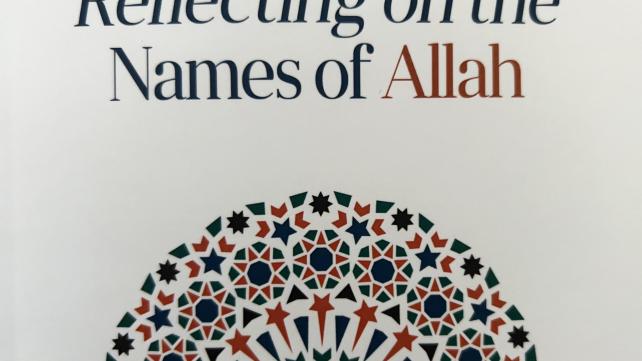
Do you have a favorite book on your nightstand, one that you keep at arm’s reach for inspiration and solace whenever you’re feeling down? I do. Whenever I need an iman boost, I pick up my permanent nightstand companion, Reflecting on the Names of Allah by Ustadha Dr. Jinan Yousef.
Unlike many Islamic books that have been translated into English and thus have stilted wording, Reflecting on the Names of Allah was composed in English and flows beautifully. It is a pleasure to read. It is also well organized; the table of contents shows the page number where each of the 99 names can be found, making it easy to look up a specific name and delve into its profound meaning.
For each of Allah’s exalted names, Yousef provides an English translation of the Quranic verse where it is mentioned. She explains the Arabic root of the name and the meaning of the root, providing examples for clarity. She then spends several paragraphs expounding upon the nuances of each beautiful attribute of Allah. To do this, she uses stories from the life of the Prophet Muhammad, peace and blessings be upon him, parables from the Quran, teachings of Islam’s great scholars, and relatable experiences from modern life.
The way Yousef delves into each of Allah’s names truly enhances my appreciation and understanding of them. For instance, I knew “Ar-Rahman” meant “The Merciful,” but I learned from Yousef’s book exactly what makes Allah’s mercy so unique, incomparable, and profound, and how “Ar-Rahman” differs from its linguistic twin, “Ar-Raheem.” Yousef writes:
In defining His relationship with us, God consistently emphasizes two essential attributes, and out of all of the attributes He could have chosen to remind us of who He is, God begins with this: mercy (rahmah). These are the names [Ar-Rahman, Ar-Rahim] that God has chosen to shart the recitation of His words, the Qur’an, at the beginning of every chapter – this is His introduction to us … This is not insignificant. First impressions are important and they set the tone for what is to come. God could have impressed upon His majesty, His strength, and His power; they are all part of His attributes. But time and time again, just in case we despair, or our hearts harden, or our minds become confused, He brings us back to remember His love and mercy. (p. 24)
Yousef’s words always soothe my heart, inspire me, and bolster my iman or faith. They make me feel even more in awe of our Creator, grateful to Him, and amazed by His incomparable majesty. Reflecting on the Names of Allah strikes a wonderful balance between scholarly work and reader-friendly text. While the subject matter is serious, complex, and somewhat academic, Yousef manages to convey the information in a practical, interesting, and welcoming way. This is not a book I trudge through; it’s a book I savor.
At the end of each chapter, in a section called “Living with this name,” Yousef offers concrete suggestions on how to apply the qualities of Allah in our daily life. This is very helpful because it keeps us from complacently understanding Allah’s attributes on solely an intellectual basis. We need to act upon our understanding in order to grow and improve as Muslims, and Yousef gives us a blueprint.
Reflecting on the Names of Allah is one of my favorite Islamic books. I would recommend it to parents who wish to teach their children about Allah’s names and attributes, converts who would benefit from an introduction to the topic, and any Muslim who wishes to know and love Allah more.
Laura El Alam is a first-generation American Muslim and the author of over 100 published articles. She has written a children’s book, Made From the Same Dough, due to be released in 2023. You can visit her online at www.seaglasswritingandediting.com.



Add new comment